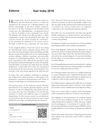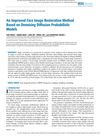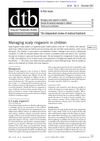 8 citations,
January 2022 in “Cureus”
8 citations,
January 2022 in “Cureus” A man's hair grew back to almost normal 7 months after COVID-19 without needing treatment.
 8 citations,
March 2015 in “Neuromuscular Disorders”
8 citations,
March 2015 in “Neuromuscular Disorders” People with Myotonic Dystrophy type 1 are more likely to have certain skin conditions, but not more likely to get skin cancer.
 7 citations,
May 2022 in “The Journal of Dermatology”
7 citations,
May 2022 in “The Journal of Dermatology” Hair loss is a frequent long-term effect of COVID-19, and oral minoxidil is the most common effective treatment.
6 citations,
October 2003 in “Journal of applied polymer science” A new method using poly(ethylene imine) improves hair dyeing at lower temperatures with better color retention.
 4 citations,
October 2021 in “Indian Journal of Plastic Surgery”
4 citations,
October 2021 in “Indian Journal of Plastic Surgery” Beard and moustache reconstruction can improve facial hair appearance with few side effects.
 3 citations,
June 2022 in “Journal of The American Academy of Dermatology”
3 citations,
June 2022 in “Journal of The American Academy of Dermatology” During the COVID-19 pandemic, more people were diagnosed with stress-related skin conditions like acne and temporary hair loss.
 3 citations,
March 2018 in “European Urology Supplements”
3 citations,
March 2018 in “European Urology Supplements” Using 5-alpha-reductase inhibitors may improve bladder cancer survival in men.
2 citations,
January 2023 in “Frontiers in Oncology” Mild oxidative stress can prevent hair loss from chemotherapy.
2 citations,
January 2022 in “The Application of Clinical Genetics” A young Russian girl with Meier-Gorlin syndrome has two new mutations in the CDC6 gene.
 2 citations,
May 2017 in “Archives of Plastic Surgery”
2 citations,
May 2017 in “Archives of Plastic Surgery” The document concludes that understanding the evolution of the human face helps cosmetic surgeons meet aesthetic desires.
 2 citations,
January 2010 in “International Journal of Trichology”
2 citations,
January 2010 in “International Journal of Trichology” The Hair India 2010 conference introduced a new hair loss classification and highlighted advanced diagnostic techniques in trichology.
 2 citations,
July 2008 in “Paediatrics & child health”
2 citations,
July 2008 in “Paediatrics & child health” Severe acne in a young girl may indicate underlying hormonal issues.
 1 citations,
January 2024 in “NPJ breast cancer”
1 citations,
January 2024 in “NPJ breast cancer” Experts agree on how to manage sugar levels and skin reactions in patients taking the cancer drug alpelisib.
 1 citations,
January 2024 in “IEEE access”
1 citations,
January 2024 in “IEEE access” The new method improves facial image restoration quality and face recognition accuracy.
 1 citations,
January 2021 in “Dermatological reviews”
1 citations,
January 2021 in “Dermatological reviews” Hair transplantation improves androgenetic alopecia with high patient satisfaction.
 1 citations,
December 2007 in “Drug and therapeutics bulletin”
1 citations,
December 2007 in “Drug and therapeutics bulletin” New treatments for children's scalp ringworm are recommended based on recent data.
November 2024 in “Journal of Investigative Dermatology” Reishi mushroom extract may help treat hair loss.
 November 2024 in “The Medical Journal of Australia”
November 2024 in “The Medical Journal of Australia” Long COVID has severely affected a couple's health, finances, and social life.
 August 2024 in “Aesthetic Plastic Surgery”
August 2024 in “Aesthetic Plastic Surgery” Exosome treatment safely increases hair density in male patients with androgenetic alopecia.
 August 2024 in “International Journal of Dermatology”
August 2024 in “International Journal of Dermatology” Exosomes show promise for treating hair loss and need more research.
 July 2024 in “Deleted Journal”
July 2024 in “Deleted Journal” PRP improves FUE hair transplant results.
 June 2024 in “Journal of clinical oncology”
June 2024 in “Journal of clinical oncology” Scalp cooling can effectively prevent hair loss during chemotherapy, improving patients' quality of life.
 April 2024 in “Public health”
April 2024 in “Public health” Vaccination and timely treatment reduce the risk of long COVID.

Transfer learning with three neural network architectures accurately classifies hair diseases.
 November 2023 in “Deleted Journal”
November 2023 in “Deleted Journal” Multimedia education greatly improves women's knowledge and management of PCOS.
 July 2023 in “International journal of obstetrics and gynaecological nursing”
July 2023 in “International journal of obstetrics and gynaecological nursing” Video teaching greatly improved PCOS knowledge among female engineering students.
 May 2023 in “British Journal of Dermatology”
May 2023 in “British Journal of Dermatology” COVID-19 can cause long-term skin problems and has changed how skin doctors work.
 February 2022 in “Journal of Cosmetic Dermatology”
February 2022 in “Journal of Cosmetic Dermatology” Argan oil protects hair from oxidative damage and reduces protein loss.
 January 2022 in “Medical research archives”
January 2022 in “Medical research archives” Taking vitamin D might improve life for MS patients and reduce skin side effects from alemtuzumab treatment.
 December 2021 in “Turkderm”
December 2021 in “Turkderm” The COVID-19 pandemic led to fewer dermatology patients, more stress-related skin conditions during the crisis, and a rise in contact dermatitis after, with ongoing concerns for public health and treatment delays.


























